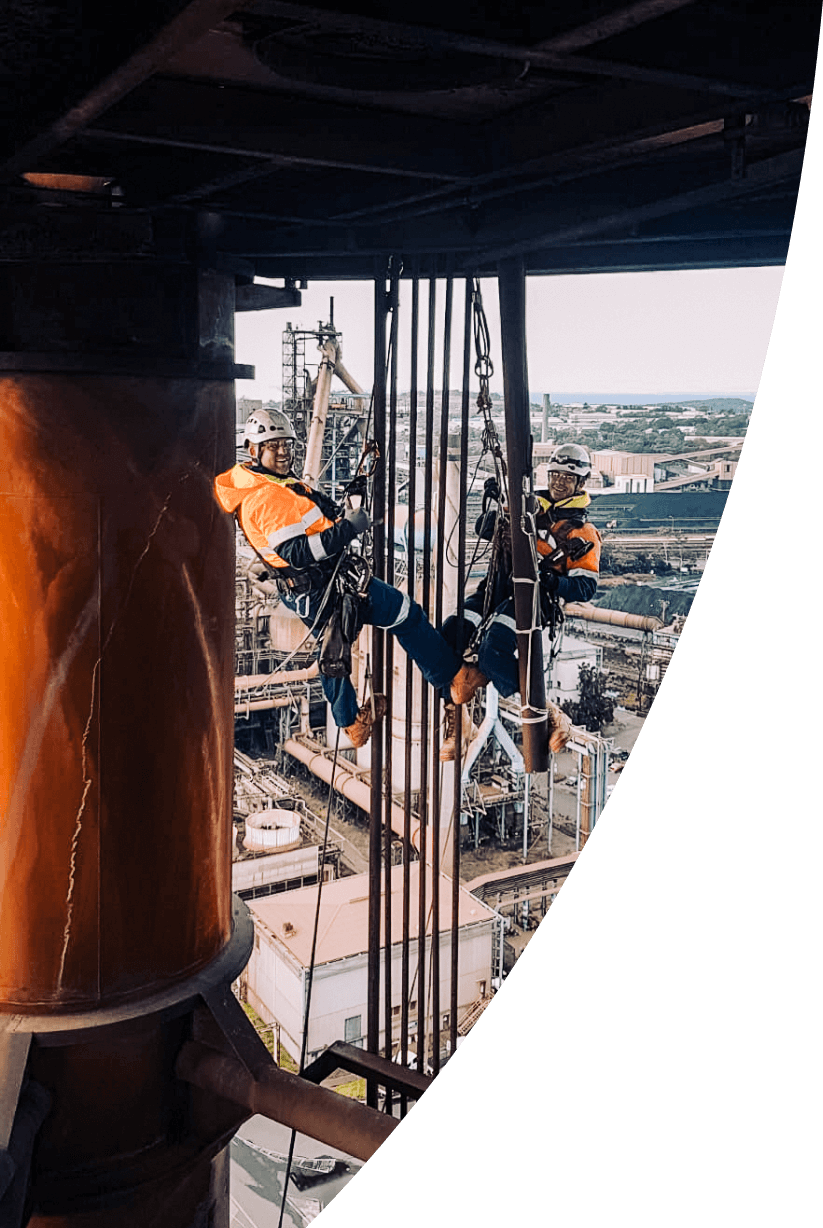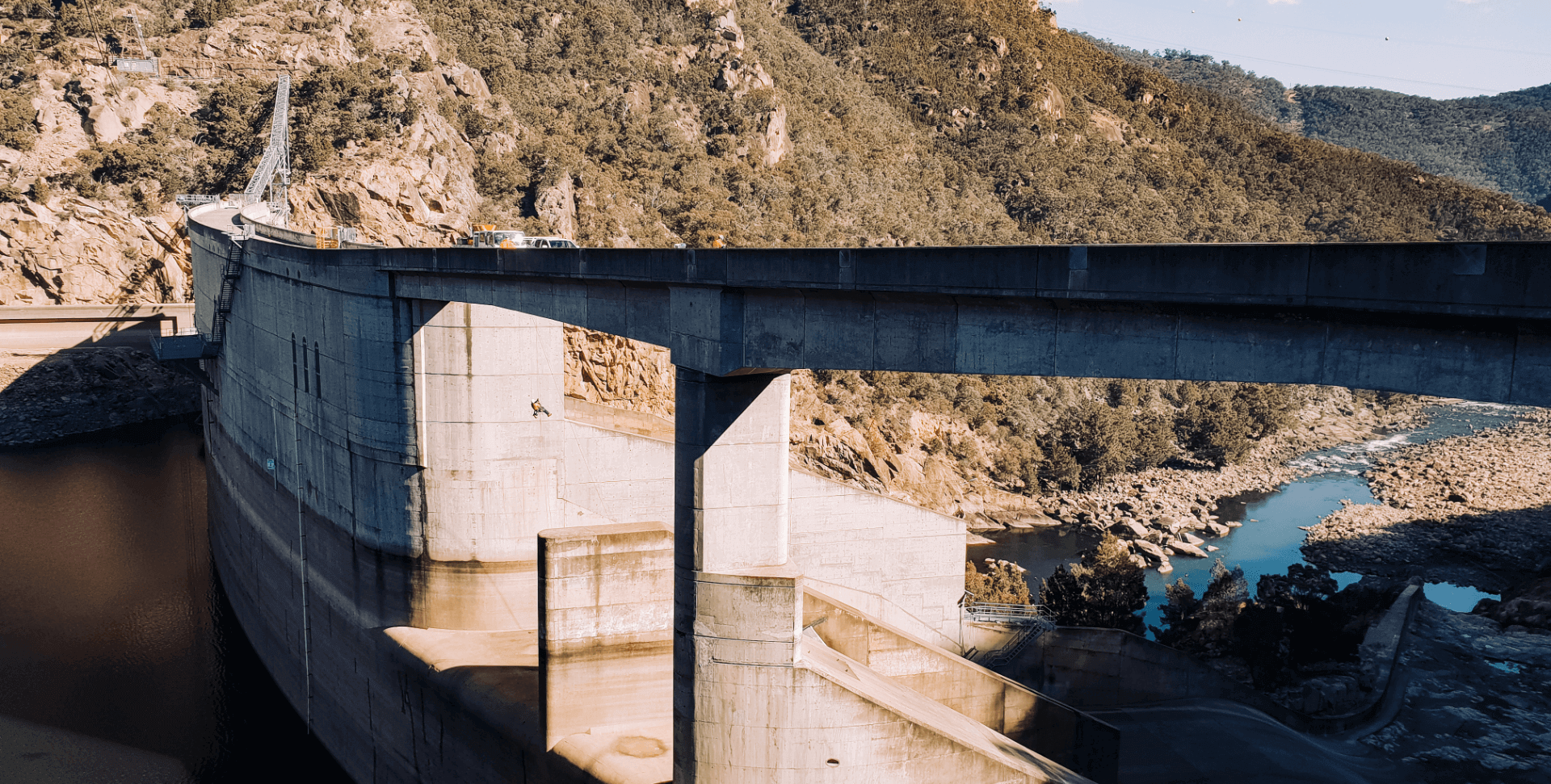

WORKING WITH DBC
What is rope access?
The industrial rope access was adopted in the late 80s as an innovative method to access sites for maintenance in the offshore oil and gas sector. Developed out of necessity to improve operations, rope access has evolved into a popular, safe and effective solution for work at height and in confined spaces. Rope access, and particularly, the IRATA international code of practice, has developed a reputation for safety and as an access method it provides an effective alternative or adjunct to other access methods.
What are the main benefits of rope access?
A good safety record, quick set up/removal, minimal environmental footprint, rope access is often a superior choice to traditional alternatives which may typically disrupt on site processes and cause time or operational delays.
What is the advantage of using an IRATA member company?
IRATA is a recognised trade association with over 500 member companies world wide. The association regulates, through its member companies, those who are assessed and qualified as technicians. An IRATA operator Member company, such as DBC Group, undergoes extensive vetting and regular independent audits to verify compliance to the IRATA ICOP and TACs. This provides assurance that you are working with a company that maintains the highest standards for safety, work quality, and rope access work practices.
Do you use your own rope access equipment?
At DBC Group, we have our own extensive equipment resources. Our team’s personal rope access kits and all our rigging equipment is DBC owned and subject to the thorough inspection regime stipulated by the IRATA International Code of Practice. This has many benefits for us and our clients. Firstly, we track every piece of equipment using an RFID system to monitor inspection status and location. All equipment is fit for purpose and regularly inspected.
How can I get involved in rope access?
If you are interested in training for, or working within the rope access space, we highly recommend seeing our careers page and our IRATA training page for information on how to get involved!
Have a question? Submit below.
TRAINING
WITH DBC
Why should I choose IRATA?
IRATA is recognised globally as the industry leader in industrial rope access. IRATA has developed its own safe system of work which includes the Training, Assessment and Certification Scheme (TACS), the International Codes of Practice (ICOP) and a system of member companies who are accredited to deliver
IRATA rope access training and assessment. IRATA’s safe system of work has produced an unprecedented safety record during its almost 30 years of operation. This system has been repeatedly shown, over 10’s of millions of work hours, to be the safest, most efficient rope access system in the world.
In contrast, other codes are essentially an independent certification body without any formal safe system of work. With only indirect control over the delivery, contents, or quality of rope access training modules. Other codes do not produce or audit to their own operating guidelines.

How fit do you have to be?
Rope access can be an exacting activity and your training course may at times push you physically, however with the correct training and proper techniques anyone with a reasonable level of strength and fitness can successfully complete the course.
That said, if you are concerned about your fitness please contact us and we can offer you some sound advice to help improve your fitness prior to your course.
Are there medical requirements?
Yes, you will need to complete a medical declaration detailing any physiological or psychological conditions which may affect your ability to safely complete the training course. You must complete the declaration honestly and we reserve the right to remove anyone from the training course at any time if we consider they pose a risk to the health and safety of themselves or others.
How will I be assessed?
Your assessment will be carried out by an independent IRATA certified assessor in accordance with the specific assessment criteria for each IRATA level. This occurs after four full days of IRATA training.
DBC has no involvement in the assessment day process other than a healthy dose of encouragement and moral support.
There are no grey areas, as the assessment is made against strict, transparent criteria which require candidates to successfully complete particular manoeuvres in a timely, efficient manner.
Your assessor will brief you prior to commencing your assessment and you are free to ask questions or seek clarification from the assessor at any time during your assessment.
What do I have to do to pass an assessment?
To pass your assessment you’ll need to complete each manoeuvre or scenario requested by your assessor in a timely, competent manner.
You also need to be aware that an IRATA rope access course is not a ‘participate and you pass’ affair. It is like sitting your driving licence, if you make too many mistakes, take too long, or fail to complete the assigned and requested manoeuvres you won’t pass your assessment.
You may fail your assessment by:
- Failing to complete a scenario or manoeuvre as instructed by your assessor
- Excessive time to complete a scenario or manoeuvre
- Committing three minor discrepancies (acts which compromise the safety of yourself or others) e.g. failing to lock a Karabiner
- Committing one major discrepancy (a critical safety issue which place yourself or others at risk) e.g. one point of contact
- Major and minor discrepancies will be explained to you by your assessor prior to the assessment and your trainers will also constantly drill you on them as we progress through the training.
What do I need to do for Level 1? Every candidate must:
- Be at least 18 years old.
- Have a reasonable standard of fitness.
- Have an aptitude for heights
- Have no medical conditions that may prevent from working safely
What do I need to upgrade for Level 2?
To upgrade from IRATA Level 1 to Level 2, you’ll need a minimum of 1000 logged hours and 12 months experience as an IRATA Level 1. This experience must be recorded in your IRATA logbook and produced on day one of the training course.
You’ll then need to complete a minimum four days of IRATA Level 2 training and pass your one day assessment.
What do I need to upgrade to Level 3?
To upgrade from IRATA Level 2 to Level 3, you’ll need a minimum of 1000 logged hours and 12 months experience as an IRATA Level 2. This means that you need at least 2000 total logged hours. Like level 2, your logbook must be produced for your course on day one of the training course.
You’ll then need to complete a minimum 4 days of IRATA Level 3 training and pass your 1 day assessment.
Why do I need an IRATA logbook?
Your IRATA logbook is used to record all your work details, including hours, tasks undertaken, height of work and access techniques used, other training, etc. It is an essential item for candidates wishing to be assessed to resit or upgrade to higher IRATA levels, as they’ll need to be able to produce a correctly filled out, up to date logbook detailing the hours worked for them to be reassessed.
You must produce your up to date logbook in advance or on day one of your training so we can check off your hours and ensure it’s completed correctly prior to your assessment. Failure to produce a logbook as required will disqualify you from undertaking training and assessment.
Logged hours must be signed off by an IRATA Level 3 or the worksite manager or supervisor.
If you are concerned about your logbook please contact us and we can offer you the necessary information to ensure that you have a logbook as per IRATA requirements for your course.
What is the IRATA TACS?
TACS refers to IRATA’s Training, Assessment and Certification Scheme which sets out the training, assessment and certification criteria for personnel engaging rope access work methods.
It details the requirements for obtaining and revalidating your IRATA certification for the various levels, explains the training syllabus and assessment criteria and provides guidance for candidates, including pre-training requirements and topics covered. The TACS also details the requirements and provides guidance for IRATA training member companies, Instructors and Assessors about the assessment process.
A digital copy of the TACS is available to download from IRATA’s website and will also be provided to each candidate in digital form prior to attending the course.
How long does IRATA certification last?
Three years.
My IRATA certification has expired, what do I do?
You may not upgrade levels if your IRATA certification has expired. This includes certifications that expire during the week of training, you must have a valid IRATA qualification on assessment day to upgrade. If you would like to upgrade levels, you must revalidate to your existing level, as detailed below. After revalidating to your existing level, you must complete 150 hours of logged rope access work before you can attend upgrade training, which consists of 4 days of upgrade training and an additional day of assessment.
If your IRATA certification has expired in the last 6 months, you are eligible to revalidate your certification at your existing level. However, if you have not worked on rope for more than 180 days, or if your certification has expired by more than 6 months, you must complete a refresher course before attending revalidation training. DBC offers refresher training for any candidates in this situation.
If your IRATA certification has expired we recommend you contact DBC in order to review and clarify the necessary next steps to renew your certification.
Please contact DBC for more details or to arrange refresher training at: info@dbcgroup.com.au or 1300 121 322
With thanks to our friends at iasolutions.co.nz who compiled this very useful list of FAQs about IRATA training and gave their permission for DBC to use them here.



